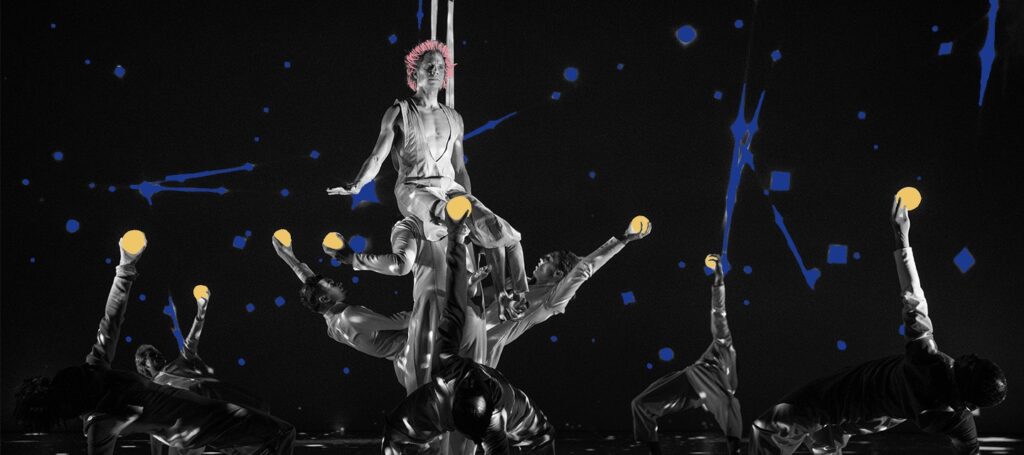


A Diluted ‘Little Prince’ Leads to Disenchantment
There was a child seated behind me at the Broadway Theatre the evening I attended The Little Prince. The boy was roughly the age I was when I first learned of Antoine de Saint-Exupéry’s exceedingly charming, poignant, heartbreaking tale. The child was getting excited, asking questions, enthralled by the pretty rainbow lights filling the space, and I was excited for him – it’s a gift, I thought, experiencing The Little Prince for the very first time! How could I have known that he was in for a disappointment instead?
The story is simple and evergreen, like all stories that eventually reveal their complexity: a pilot crash lands in the desert, where he encounters a little prince who’s traveled across the universe. The two displaced travelers become fast friends and the little prince starts to tell the pilot of all the planets he’s visited thus far, as the two make their way through the desert hoping to survive.
Experiencing The Little Prince in the time of Covid-19, with the haggard spirit of an adult having internalized isolation on a whole new level, was strangely eye-opening. The different single-occupant planets on the little prince’s journey used to be abstract archetypal concepts of adulthood, but now, I recognize those caricatures of humanity with a newfound specificity. I know The Vain Man (Antony Cesar) with that practiced smize in high angle selfies; I’ve had similar days as the Drunkard (Marie Menuge) whose world is just enough out-of-focus to be bearable amidst chaos; I’ve both pitied and envied the Lamplighter (Marcin Janiak) whose identity can be distilled into a singular task as the world keeps spinning on faster and faster still – those people, each on their own lonely planet, are just behind those lit-up windows on a dark street, as though stars in the night sky.
For the first time, I recognize the significance of the context in which Saint-Exupéry wrote the piece when he was an exiled expat in NYC on the cusp of WWII. Much like his displaced traveler, willing himself to see the sheep (possibility of companionship and gentleness) through a box (the unwelcoming state of being a stranger in a strange land). That, I believe, is something I recognize as the intent behind Anne Tournié’s choreography and directorial choices, all of which are unfortunately buried in this ultimately confused and unoriginal production.
Going into the show, I was expecting a stylized interpretation of The Little Prince with a modern point of view, incorporating acrobatic as well as aerial dance, music, and video projections. Indeed, I received all of the components of what the show advertised, except this live illustration of a beloved story became a garish display of disjointed aesthetics and awkward storytelling.
Chris Mouron, who wrote the libretto and co-directed, serves as the narrator and gives voice to all the characters. The narration, however, is redundant at best, and mostly distracting as it interrupts the visual storytelling taking place onstage. The narrator in Saint-Exupéry’s book, is a version of the author himself, as well as the pilot. However, the narrator here doesn’t emphasize a connection with anyone in the story at all. Mouron is outfitted like an extra from the set of The Wizard of Oz, complete with green hair and a vaguely period looking jacket. Other cringy design choices include The Fox (Dylan Barone), who wears a headdress that resembles an afro while asking to be tamed by the little prince.
The music and orchestration throughout the piece are reminiscent of royalty-free tracks. Combined with videos that look stitched together with stock footage, the whole thing gives off a poorly-made 90’s music video vibe.
The aforementioned elements unfortunately drown out any personalities created by the dancers, who are in fact excellent. Lionel Zalachas is a livewire as the titular character whose presence is equal parts elegance and power; the duet between the little prince and the rose is gorgeous: Laurisse Sulty personifies the dignity and vulnerability of a flower who’s a little vain, but also a little lonely. The Drunkard’s tumbles and spins juxtaposed with the Businessman’s spasms and sharp edges were also delightful to see. However, I was disappointed by the lack of variety in the movement-based storytelling, as each section is presented with a rushed motif, without any connective tissues to propel the narrative forward.
By the end of the show, I was in denial.
I’ve always thought that there couldn’t be a wrong way to tell the story of The Little Prince. From reading the book as a child, to seeing Riccardo Cocciante’s musical adaptation in 2007, to watching the charming Netflix animated film in 2015 as an adult, my appreciation for it gets stronger and renewed each time. But now, as I think of that little boy who sat behind me having no fun at all at the Broadway spectacle, I hope he gets another chance to be introduced to the story, because it’s rather tragic that this was his first time meeting The Little Prince.
Keep Reading

A Recipe for Love is Served in ‘Birthday Candles’
Familiarity often breeds contempt but in Noah Haidle’s Birthday Candles, it also serves as the ingredient of love. Over the course of the 90 minutes of this tightly calibrated Broadway debut, that love transforms Ernestine (Debra Messing) from a rebellious 17-year-old on the cusp of greatness into a 107-year-old great-grandmother who holds her family together. […]
Read More
While Looking at History “Suffs” Elects Didacticism Over Adventurousness
Shaina Taub has spent eight years researching and condensing the adventures of women’s rights activist Alice Paul and her cronies into a manageable tale. Despite the comparatively concise final product, at nearly three hours in runtime, Suffs (shorthand for women who fought to win the right to vote) still feels too long to absorb in […]
Read More












